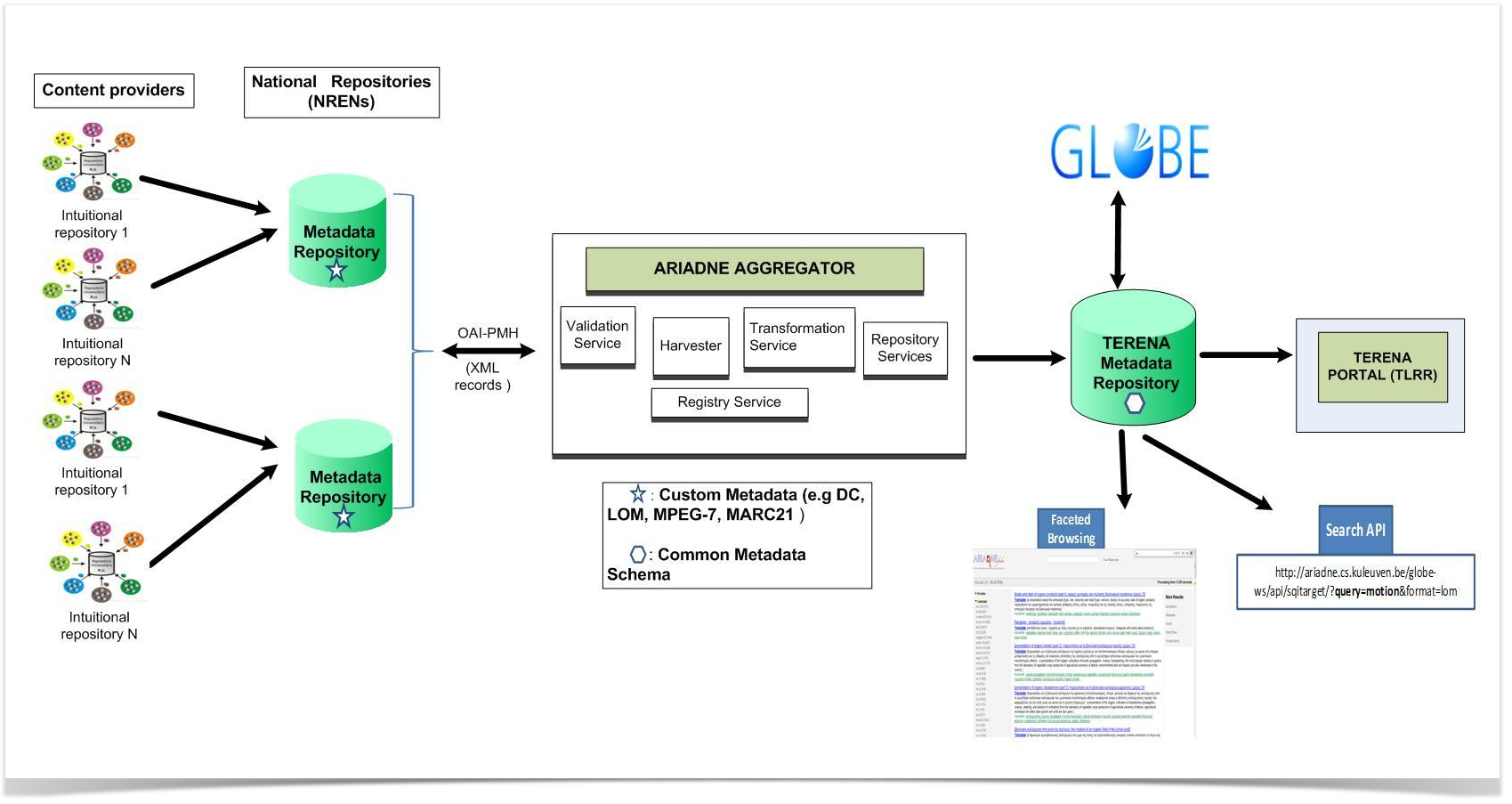Contents: | Contact details: TF-Media mailing list is at <tf-media@terena.org> TERENA PDO is Peter Szegedi <szegedi@terena.org>
|
|---|
...
The TERENA small project is to bridge the gap between the end of TF-Media (now) and the beginning of GN4 (April 2015). The reason why the idea must be tested in a TERENA small project before it’s introduced in GÉANT is the fact that the critical mass (in terms of participants, support, interest, etc.) has to be gained before any sustainable service development can be done. OER seems to be a typical “chicken-n-egg” problem at the moment (i.e. without a working prototype it’s hard to gain significant interest and without significant interest it’s hard to convince the development) therefore, the TERENA small project has to take this initiative. The OER is not the service that the NREN community is desperate to build (e.g., like the Trusted Cloud Drive pilot was in 2012) but it’s something that TERENA has to take the lead on (e.g., like the NRENum.net service pilot was in 2008) in order to facilitate the development of future value-added services on top (including MOOCs and others).
| Anchor | ||||
|---|---|---|---|---|
|
The TERENA small project can be delivered in four tasks over 9 months (relaxed timeline):
...
2nd meeting - 2 April 2014 @ 10.00 CEST
3rd meeting - 12 May 2014 @ 14.00 CEST
4th meeting - 15 May 2014 @ 11.00 CEST
Next coming:
5th meeting - TBC
| Anchor | ||||
|---|---|---|---|---|
|
| Note | ||
|---|---|---|
| ||
Attendees: Eli, Kostas, Vicente, Rui, Adam, Antonio, Peter Agenda:
Recording: http://emeeting.campusdomar.es/recording/4bcc81ced2cb65ced4c3f95720654625 Notes: Peter predented the DRAFT table of contents for the Initial Study and opened the floor for comments and discussion. Coordinator: IUCC Contributors: GRNET, UVigo, ISEP Deadline: 15 August 2014 ----- OER state-of-the-art and outlook 2. Architecture design 3. Promotion and outreach ----- Eli commented that Chapter 1 should give the bigger picture (open education, MOOC, etc.) and the whole study should narrow down to the specific recommendations and requirements. We have to clearly understand the current trends in education and response to that. Vicente added that first we should describe the "idealistic" picture reagarless of the existing tools and then in Chapter 2 we should take into acount what tools we can reuse and see how close we can get to the idealistic solution. The closer the better. Antonio commented that the understanding on the typical workflow how professors develop courses and use tools (such as Moodle LMS) is the key. The proper liaison with the various institutional repositories (mostly DSpace-based in Portugal) is also important to support the federated model. Trust is the key for quality assurance (the use case of sexual education was mentioned where finding good quality educational content is difficult). Integrating with AAI and developing functions such as the peer review system could maintain the trust relationship with content providers. Antonio and Vicente offered help to incorporate the professors' view and review the study from the education perspective. It was also suggested to use Google docs for the collaboration and distribution of the study. Peter noted that the administrative steps (contracting, etc.) will be done shortly after TNC2014.
|
| Anchor | ||||
|---|---|---|---|---|
|
| Note | ||
|---|---|---|
| ||
Attendees: Eli, Giannis, Kostas, Rui (partly), Nelson, Adam, Peter Agenda:
Notes:
Peter summarised the key requirements comming from the Personas proposed at the last meeting. The group made an effort to categorise the Personas. Two main categories have been identified: a) End-users; such as students, professors and researchers (i.e. A, B, C, D, G, K) b) E-learning administrators; such as service managers and system/service integrators (i.e. E, F) Giannis suggested to extract the requirements from the Personas and identify the list of "top problems" that we are trying to give an answer to. Attendees had a consensus on writting an initial study that leads to some clear design requirements concerning both the aggregation engine (back-end) and the web protal (front-end). Such a study must be done by mid August 2014 as the latest so that the necessary software developments and deployments (recommended by the study) can be done by the end of the year. Eli (IUCC) agreed to coordinate the production and delivery of such a study and Giannis (GRNET) offered to contribute to the harvesting engine related technical parts of the study. Adam (NIIF) and Nelson (FCCN) will check back whether they could also contribute to the study, provided that the draft table of content of the study is agreed. The attendees did a short brainstorming on the potential content of the study. Peter suggested that the study should start with a technical overview on the state-of-the-art content repositories and their basic characteristics. Giannis said that the overall picture should also be described including similar global (e.g., GLOBE) and European (e.g., openeducationeurope.eu) initiatives and their relation to TERENA OER. The basic information model, metadata schema, and protocol set should also be suggested by the study. Contribution to the user interface and the web front-end requirements is necessary. The functional description should look ahead to 3-5 years in time taking into account the latest trends in on-line teaching & learning . The study must be delivered by 15 August 2014 as the latest, the harvesting engine adaptation and deployment as well as the web portal development can then go hand in hand base don the recommendations of the study. The next meeting will be dedicated to the discussion on the Table of Content of the study.
|
...
